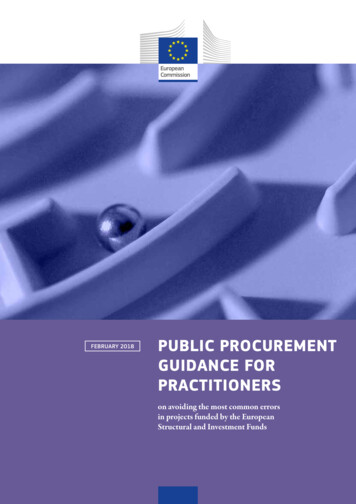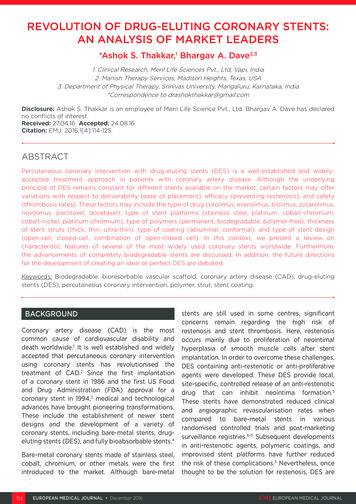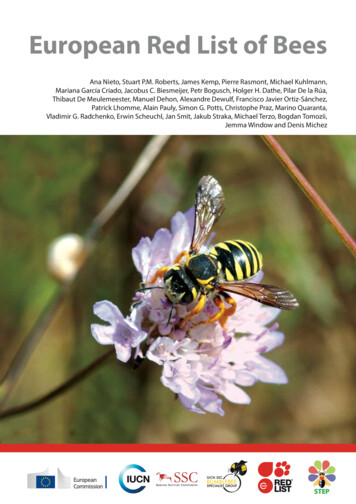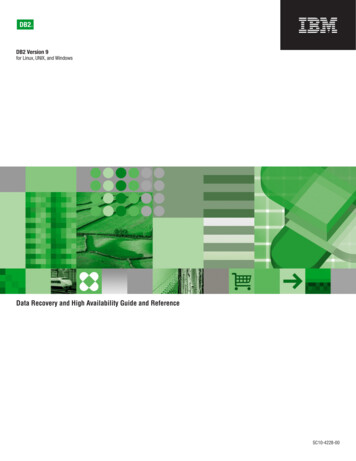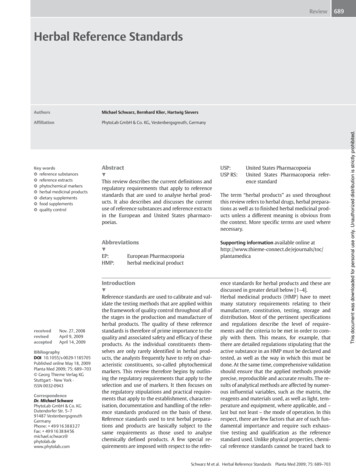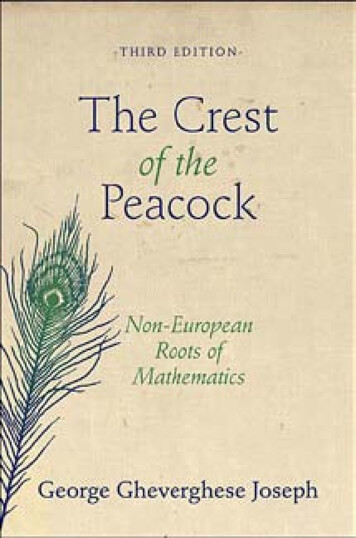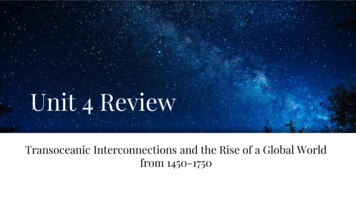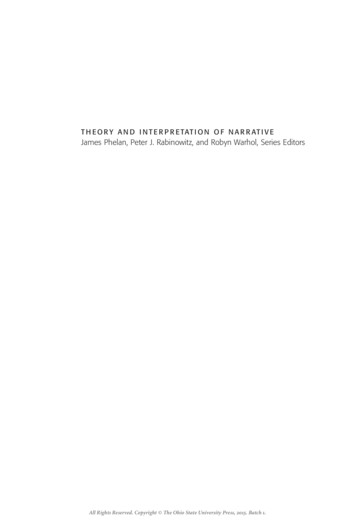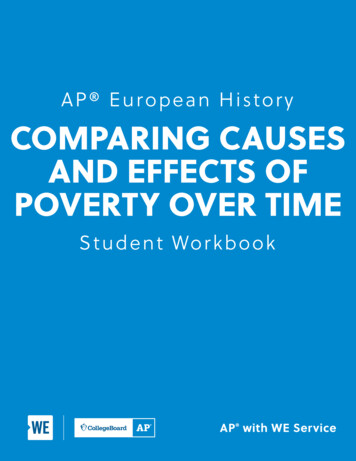
Transcription
A P E u r o p ean H istor yCOMPARING CAUSESAND EFFECTS OFPOVERTY OVER TIMES t u d e nt Wor kb ookAP with WE Service
Table of ContentsGetting to Know the Topic–Globally.4Getting to Know the Topic–Locally.5Sources for Lesson 1: Poverty During the Reformation.6Assessing Lesson 1: Poverty During the Reformation.12Sources for Lesson 2: British Enclosure During the Agricultural Revolution.13Assessing Lesson 2: British Enclosure During the Agricultural Revolution.21Sources for Lesson 3: French Revolution.22Assessing Lesson 3: French Revolution.26Sources for Lesson 4: Industrialization.27Assessing Lesson 4: Industrialization.35Ten Solutions to Poverty.36Sources for Lesson 5: Poverty in the 20th Century.3820th-Century Responses to the Poor.39Assessing Lesson 5: Poverty in the 20th Century.44Problem Tree.45Needs Assessment.46Solution Tree.47Reflect: Investigate and Learn.48Summarizing Your Investigation.49Approaches to Taking Action Information Sheet.50Creating the Action Plan .51Five Action Planning Pitfalls Tip Sheet.52Reflect: Action Plan.53Student Log Sheet.543POVERTY MODULE FOR AP EUROPEAN HISTORYAP WITH WE SERVICE
Getting to Know the TopicPoverty: GloballyMahatma Gandhi once said, “Poverty is the worst form of violence.” Extreme poverty is defined by the World Bank asan average daily consumption of less than 1.25 a day. For a family, living in poverty can mean choosing between foodor clean water, school fees or hospital bills, emergencies or debt. For some, there is barely enough money to survivefrom one day to the next.The effects of long-term poverty are damaging to health and development. Child poverty involves a significant lack ofthe basic requirements for healthy physical, mental, and emotional development.Fast facts One billion children worldwide are living in poverty. According to UNICEF, 22,000 children die each day due to poverty. Nearly 1/2 of the world’s population—more than 3 billion people—live on less than 2.50 a day. More than 1.3billion live in extreme poverty—less than 1.25 a day. By 2030, an estimated 80% of the world’s extreme poor will live in fragile contexts. Sub-Saharan Africa has both the highest rate of children living in extreme poverty at 49% and the largest share ofthe world’s extremely poor children at 51%.Taking Action GloballyThere are a number of ways that students can take action in their own school and community to help developingcommunities around the world combat poverty. Some ideas include: Volunteer at an organization that works for global poverty issues—many organizations offer ways to get involvedon their websites and in their offices Collect supplies (in consultation with the organization) or raise funds for an organization that will share theoutcomes of the donations Create a letter-writing campaign to the United Nations, government bodies, and other leaders to ask for addedresources on the issueAnother option is to support and fundraise for the WE Villages program. Students can support this program by visitingWE.org/we-schools/program/campaigns to get ideas and resources for taking action on global poverty.The poorest 1/2 of the world’spopulation has the same amount ofcombined wealth as the 8 richestpeople on the planet.4POVERTY MODULE FOR AP EUROPEAN HISTORYAP WITH WE SERVICE
PLANGetting to Know the TopicPoverty: LocallyThe United States Census Bureau uses an annual income of 26,200 for a family of four as the threshold to determinepoverty status. Thresholds go up or down depending on household size.When families cannot afford basic necessities, they must make decisions about what to go without: groceries orelectricity, diapers or school supplies, housing or medical care. Poverty has negative long-term effects on children’shealth, nutrition, and education. Compared to children whose parents have an income twice that of the poverty line,children who live in poverty are nearly three times more likely to have poor health and, on average, they complete twofewer years of school and earn less than half as much money over the long-term of their future careers.Fast facts The number of shared households (homes in which adults who are not related or married live together) was 20% ofhouseholds in 2019, up from 17% in 2007. Poverty is not unique to cities. In fact, poverty rates are slightly higher in non-metropolitan areas. Poor children earn less than half as much in their future careers as their peers growing up at twice the poverty line.Taking Action LocallyWithin their local or national community, students can: Work with a local organization addressing the topic Work with a community center that helps disadvantaged families develop employable skills and find work Create and deliver an educational workshop to raise awareness about poverty and its local impact with a strongcall to action that leads to enacting changeWith both their global and local actions, encourage students to be creative with the ideas they develop through theiraction plans.29 % of people with adisability live in poverty—that’s more than 4 millionAmericans.5POVERTY MODULE FOR AP EUROPEAN HISTORYAP WITH WE SERVICE
Sources for Lesson 1: Poverty During the ReformationPope’s Focus on Poor Revives Scorned Theologyrepression who was assassinated during Mass in 1980.By Jim Yardley and Simon RomeroFrancis broke the stalemate.May 23, 2015“It is very important,” Father Gutiérrez said. “SomebodyVATICAN CITY — Six months after becoming the first Latinwho is assassinated for this commitment to his people willAmerican pontiff, Pope Francis invited an octogenarian priestilluminate many things in Latin America.”from Peru for a private chat at his Vatican residence. Notlisted on the pope’s schedule, the September 2013 meetingThe beatification is the prelude to what is likely to be awith the priest, Gustavo Gutiérrez, soon became public —defining period of Francis’ papacy, with trips to Southand was just as quickly interpreted as a defining shift in theAmerica, Cuba and the United States; the release of aRoman Catholic Church.much-awaited encyclical on environmental degradationand the poor; and a meeting in Rome to determine whetherFather Gutiérrez is a founder of liberation theology, the Latinand how the church will change its approach to issues likeAmerican movement embracing the poor and calling forhomosexuality, contraception and divorce.social change, which conservatives once scorned as overtlyMarxist and the Vatican treated with hostility. Now, FatherBy advancing the campaign for Archbishop Romero’sGutiérrez is a respected Vatican visitor, and his writingssainthood, Francis is sending a signal that the allegiancehave been praised in the official Vatican newspaper. Francisof his church is to the poor, who once saw some bishopshas brought other Latin American priests back into favoras more aligned with discredited governments, manyand often uses language about the poor that has echoes ofanalysts say. Indeed, Archbishop Romero was regarded as aliberation theology.popular saint in El Salvador even as the Vatican blocked hiscanonization process.And then came Saturday, when throngs packed San Salvadorfor the beatification ceremony of the murdered Salvadoran“It is not liberation theology that is being rehabilitated,” saidarchbishop Óscar Romero, leaving him one step fromMichael E. Lee, an associate professor of theology at Fordhamsainthood.University who has written extensively about liberationtheology. “It is the church that is being rehabilitated.”The first pope from the developing world, Francis has placedthe poor at the center of his papacy. In doing so, he is directlyLiberation theory includes a critique of the structural causesengaging with a theological movement that once sharplyof poverty and a call for the church and the poor to organizedivided Catholics and was distrusted by his predecessors,for social change. Mr. Lee said it was a broad school ofPope John Paul II and Pope Benedict XVI. Even Francis, as athought: movements differed in different countries, withyoung Jesuit leader in Argentina, had qualms.some more political in nature and others less so. The broadermovement emerged after a major meeting of Latin AmericanNow, Francis speaks of creating “a poor church for the poor”bishops in Medellín, Colombia, in 1968 and was rooted inand is seeking to position Catholicism closer to the massesthe belief that the plight of the poor should be central to— a spiritual mission that comes as he is also trying to reviveinterpreting the Bible and to the Christian mission.the church in Latin America, where it has steadily lost groundto evangelical congregations.But with the Cold War in full force, some critics denouncedliberation theology as Marxist, and a conservative backlashFor years, Vatican critics of liberation theology andquickly followed. At the Vatican, John Paul II, the Polish popeconservative Latin American bishops helped stall thewho would later be credited for helping topple thecanonization process for Archbishop Romero, even thoughmany Catholics in the region regard him as a towering moralfigure: an outspoken critic of social injustice and political6POVERTY MODULE FOR AP EUROPEAN HISTORY
Soviet Union, became suspicious of the political elements ofdisparities and “condemned many others to hunger.” He hasthe new Latin American movements.warned, “Without a solution to the problems of the poor, wecannot resolve the problems of the world.”“All that rhetoric made the Vatican very nervous,” said IvanPetrella, an Argentine lawmaker and scholar of liberationIn Argentina, some critics are unconvinced that Francis’theology. “If you were coming from behind the Iron Curtain,outspokenness about the poor represents an embrace ofyou could smell some communism in there.”liberation theology. “He never took the reins of liberationtheology because it’s radical,” said Rubén Rufino Dri, whoJohn Paul reacted by appointing conservative bishops inworked in the late 1960s and 1970s with a group of priestsLatin America and by supporting conservative Catholicactive in the slums of Buenos Aires.groups such as Opus Dei and the Legionaries of Christ,which opposed liberation theology. In the 1980s, CardinalTo him, Francis’ decision to expedite Archbishop Romero’sJoseph Ratzinger — later to become Pope Benedict XVI,beatification was a political one, part of what Mr. Rufinobut then the Vatican’s enforcer of doctrine — issued twoDri views as a “superficial transformation” of the Catholicstatements on liberation theology. The first was very critical,Church as it competes in Latin America with secularism asbut the second was milder, leading some analysts to wonderwell as other branches of Christianity.if the Vatican was easing up.“It’s a populist maneuver by a great politician,” he said.From his 1973 appointment as head of the Jesuits inArgentina, Francis, then 36 and known as Jorge MarioOthers offered a more nuanced view. José María di Paola,Bergoglio, was viewed as deeply concerned with the poor.53, a priest who is close to Francis and once worked withBut religious figures who knew him then say Francis,him among the poor of Buenos Aires, said the beatificationlike much of Argentina’s Catholic establishment, thoughtreflected a broader push by Francis to reduce the Vatican’sliberation theology was too political. Critics also blamed himfocus on Europe. “It’s part of a process to bring an end to thefor failing to prevent the kidnapping and torture of two priestschurch’s Eurocentric interpretation of the world and have asympathetic to liberation theology.more Latin American viewpoint,” he said.Some in the church hierarchy considered Francis divisiveFather di Paola added that while Francis had never proposedand autocratic in his 15 years leading the Jesuits. The churchevangelizing under the banner of liberation theology duringauthorities sent him into what amounted to stretches of exile,his time in Argentina, his commitment to the poor should notfirst in Germany and then in Córdoba, Argentina, a periodbe questioned. “Francis’ passage through the slums of thein which he later described having “a time of great interiorcapital influenced him later as a bishop and pope,” he said.crisis.”“Experiencing the life values of the poor transformed hisheart.”He practiced spiritual exercises and changed his leadershipstyle to involve greater dialogue. When he was namedAs pope, Francis has expanded the roles of centristsarchbishop of Buenos Aires, his focus became those leftsympathetic to liberation theology, such as Cardinal Óscarbehind by Argentina’s economic upheaval.Rodríguez Maradiaga of Honduras, in contrast to the cloutonce wielded in Latin America by conservative cardinals like“With the end of the Cold War, he began to see that liberationAlfonso López Trujillo of Colombia, who died in 2008.theology was not synonymous with Marxism, as manyconservatives had claimed,” said Paul Vallely, author of “Pope“Trujillo represented the thinking that liberation theology wasFrancis: Untying the Knots.” Argentina’s financial crisis ina Trojan horse in which communism would enter the church,the early years of the 21st century also shaped his views, assomething that is finally coming undone with Pope Francis,”he “began to see that economic systems, not just individuals,said Leonardo Boff, 76, a prominent Brazilian theologian whocould be sinful,” Mr. Vallely added.has written on liberation theology.Since becoming pope, Francis has expressed strong criticismMany analysts note that John Paul and Benedict neverof capitalism, acknowledging that globalization has liftedoutright denounced liberation theology and slowlymany people from poverty but saying it has also created greatPOVERTY MODULE FOR AP EUROPEAN HISTORY7
started to pivot in their views. In 2012, Benedict reopened“He began to surprise people,” said Jon Sobrino, a prominentArchbishop Romero’s beatification case. Cardinal Gerhardliberation theologian who became close to ArchbishopMüller, a staunch conservative who heads the CongregationRomero and credited his transformation to his embrace of thefor the Doctrine of the Faith, the Vatican’s enforcer ofpoor.doctrine, became a proponent of liberation theology afterworking in Peru, where he met Father Gutiérrez. The two men“They made him be different, be more radical, like Jesus,”have since written books together.Father Sobrino said. “He drew near to them, and theyapproached him, asking for help in their suffering. That was“There was no rehabilitation because there was never awhat changed him.”‘dehabilitation,’ ” Father Gutiérrez said, contesting the ideathat liberation theology was ever cast out of the church.In 2007, Father Sobrino had his own clash with the Vatican“In past years, there was talk of condemnation, and peoplewhen the doctrinal office disputed some of his writings. Hebelieved it. What there was was a critical dialogue, which hadrefused to alter them and attributed the freeze on Archbishopdifficult moments but which really was clarified over time.”Romero’s beatification partly to Vatican hostility.Francis often urges believers to act on behalf of the poor,“It has taken a new pope to change the situation,” he said.saying if they do, they will be transformed. For those who——————————knew Archbishop Romero in El Salvador, this transformationwas notable. Once considered a conservative, he began toJim Yardley reported from Vatican City, and Simon Romerochange in the mid-1970s, when he was the bishop of a ruralfrom Rio de Janeiro. Elisabeth Malkin and Gene Palumbodiocese where government soldiers had massacred peasants.contributed reporting from San Salvador, and JonathanShortly after he became archbishop of San Salvador, he wasGilbert from Buenos Aires.horrified when a close friend, a Jesuit priest, was murdered,and he soon began to speak out against government terrorand repression.8Peasants’ main concerns in 12Articles of Swabian PeasantsLuther’s main concerns inAdmonition to PeaceLuther’s main concerns inCondemnation of Peasant RevoltKeys words that you’d want to noteKeys words that you’d want to noteKey words that you’d want to noteWhy did the peasants have thoseconcerns?Why did Luther respond the waythat he did?Why did Luther’s response change?POVERTY MODULE FOR AP EUROPEAN HISTORYAP WITH WE SERVICE
The Twelve Articles of the Swabian Peasants,March, 15251.It is our humble petition That each communityshould choose and appoint a pastor, and that we shouldhave the right to depose him should he conduct himselfimproperly 2.We are ready and willing to pay the fair tithe of grain The small tithes [of cattle], whether [to] ecclesiastical or11. We will entirely abolish the due called Todfall [heriot,or death tax, by which the lord received the best horse,cow, or garment of a family upon the death of a serf] andwill no longer endure it, nor allow widows and orphansto be thus shamefully robbed against God’s will, and inviolation of justice and right 12. It is our conclusion that if any one or more of thearticles here set forth should not be in agreement withthe Word of God such article we will willingly retract.lay lords, we will not pay at all, for the Lord God createdcattle for the free use of man 3.We take it for granted that you will release us fromserfdom as true Christians, unless it should be shownus from the Gospel that we are serfs.4.It has been the custom heretofore that no poor manshould be allowed to catch venison or wildfowl or fishin flowing water, which seems to us quite unseemly andunbrotherly as well as selfish and not agreeable to theWord of God 5.We are aggrieved in the matter of woodcutting, for thenoblemen have appropriated all the woods to themselves 6.7.to the lords.]. [N]ow let me, in all kindness andcharity, address myself to you. I have acknowledgedthat the princes and lords who prohibit the preachingof the gospel, and who load the people with intolerableburdens, have well merited that the Almighty shouldcast them from their seats, seeing that they have sinnedagainst God and against man If you act with conscience, moderation, and justice,God will aid you; and even though subdued for themoment, you will triumph in the end; and those of youproperly looked into so that we shall not continue to bewho may perish in the struggle, will be saved. But if youoppressed in this way have justice and conscience against you, you will fail;We will not hereafter allow ourselves to be furtherand even though you were not to fail, even though youoppressed by our lords, but will let them demand onlywere to kill all the princes, you would be none the lesswhat is just and proper according to the word of theeternally damned.from the peasant without payment We are greatly burdened because our holdings cannotsupport the rent exacted from them We ask that thelords may appoint persons of honor to inspect theseholdings and fix a rent in accordance with justice We are burdened with a great evil in the constant makingof new laws In our opinion we should be judgedaccording to the old written law 10. We are aggrieved by the appropriation of meadowsand fields, which at one time belonged to a communityas a whole. These we will take again into our own hands 9 To the peasants [Luther had just addressed a sectionare increased from day to day, we ask that this matter beshould no longer try to force more services or other dues9.Martin Luther, Admonition to Peace, 1525In regard to the excessive services demanded of us whichagreement between the lord and the peasant. The lord8.Doc 2POVERTY MODULE FOR AP EUROPEAN HISTORY Put no trust in the prophets of murder whom Satanhas raised up amongst you though they sacrilegiouslyinvoke the name of the holy gospel. They will hate me,I know, for the counsel I give you What I desire is, tosave from the anger of God the good and honest amongyou; I care not for the rest, I heed them not, I fear themnot I know One who is stronger than all of them puttogether, and he tells me in the 3rd Psalm to do thatwhich I am now doing. The tens of thousands, and thehundreds of thousands, intimidate not me But say you, authority is wicked, cruel, intolerable; it willnot allow us the gospel, it overwhelms us with burdensbeyond all reason or endurance To this I reply, that thewickedness and injustice of authorityAP WITH WE SERVICEINVESTIGATE AND LEARNDoc 1
are no warrant for revolt, seeing that it befits not alltithe which does not belong to you; this would be amen to take upon themselves the punishment ofspoliation and robbery, if you wish to do good, let itwickedness. [T]he natural law says that no manbe with your own money and not with that of othershall be the judge in his own cause, nor revenge hispeople. God himself has told us that he despises anown quarrel. The divine law teaches us the sameoffering which is the product of theftlesson: Vengeance is mine, saith the Lord, I will repay. Your enterprise, therefore, is not only wrongthe other patriarchs, as well as the prophets, keepaccording to Bible and gospel law, but it is opposedbondmen?also to natural law and you cannot properly propositions respecting game, wood, feudal services,it by a new commandment of God, especially directedassessment of payments, ix., I refer these matters toto you, and confirmed by miracles.the lawyers; I am not called upon to decide respectingthem; but I repeat to you that the Christian is a martyr,and that he has no care for all these things; cease,not the beam in your own. Authority is unjust, in thatthen, to speak of the Christian law, and say rather thatit interdicts [forbids] the Gospel, and oppresses youit is the human law, the natural law that you assert,with burdens; but you are still more in the wrongfor the Christian law commands you to suffer as toeven than authority, you who, not content withall these things, and to make your complaint to Godforbidding the Word of God, trample it under foot,and assume to yourselves the power reserved to Godalone.alone Now authority, it is not to be denied, unjustlyDoc 3deprives you of your property, but you seek to depriveMartin Luther, Condemnation of Peasant Revolt, 1525authority, not only of property, but also of body and of life.they promised to yield to law and better instruction,as Christ also demands (Matt. 7:1 — “Do not judge,were defendable, there would remain upon the earthor you too will be judged”). But before I can turnneither authority, nor order, nor any species ofaround, they go out and appeal to force, in spite ofjustice. [N]ought would be seen but murder, rapine,their promises, and rob and pillage and act like madand desolation. dogs, from this it is quite apparent what they had in [H]owever just your demands may be, it befits nottheir false minds, and that what they put forth undera Christian to draw the sword, or to employ violence;the name of the gospel in the “Twelve Articles” was allyou should rather suffer yourselves to be defrauded,vain pretense. In short, they practice mere devil’s work according to the law which has been given unto you(1 Corinthians, vi.) In my preceding pamphlet [on the “Twelve Articles”]I had no occasion to condemn the peasants, becauseDo you not perceive, my friends, that if your doctrine Answer to the eight last Articles. — As to yourpersevere in it, unless you prove that you are called toYou see the mote in the eye of authority, but you see Answer to Article 3. — [D]id not Abraham and Since, therefore, those peasants and miserablewretches allow themselves to be led astray andIt is absolutely essential, then, that you should eitheract differently from what they declared, I likewiseabandon your enterprise and consent to endure themust write differently concerning them; and firstwrongs that men may do unto you, if you desire stillbring their sins before their eyes, as God commandsto bear the name of Christians; or else, if you persist(Ezekiel 2:7 — “You must speak my words to them,in your resolutions, that you should throw aside thatwhether theyname, and assume some other. Choose one or theother of these alternatives: there is no medium. Answer to Article 1. — If authority will not support apastor who is agreeable to the feelings of a particularparish, the parish should support him at his ownexpense. If authority will not permit this pastor topreach, the faithful should follow him elsewhere. 10Answer to Article 2. — You seek to dispose of aPOVERTY MODULE FOR AP EUROPEAN HISTORYAP WITH WE SERVICE
listen or fail to listen, for they are rebellious”),devilish than a rebellious man. Just as one must slaywhether perchance some of them may come toa mad dog, so, if you do not fight the rebels, they willtheir senses, and, further, I would instruct those infight you, and the whole country with you.authority how to conduct themselves in this matter. with the gospel, call themselves Christian brethren have these peasants loaded themselves, for whichThereby they become the greatest blasphemers andthey have deserved a manifold death of body andviolators of God’s holy name, and serve and honor thesoul.devil under the semblance of the gospel, so that theyhave ten times deserved death of body and soul MayFirst, they have sworn to their true and graciousthe Lord restrain him! Lo, how mighty a prince is therulers to be submissive and obedient, in accord withdevil, how he holds the world in his hands and canGod’s command (Matt. 12: 21), “Render thereforeput it to confusion; who else could so soon capture sounto Caesar the things which are Caesar’s,” andmany thousands of peasants, lead them astray, blind(Rom. 8:1), “Let every soul be subject unto theand deceive them, stir them to revolt, and make themhigher powers.” But since they have deliberately andthe willing executioners of his malice —sacrilegiously abandoned their obedience, and inaddition have dared to oppose their lords, they have Third, they cloak their frightful and revolting sinsWith threefold horrible sins against God and men And should the peasants prevail (which God forbid!),thereby forfeited body and soul for God wills that we know not but that [God] is preparing for thefidelity and allegiance shall be sacredly kept.judgment day, which cannot be far distant, and maySecond, they cause uproar and sacrilegiously rob andpillage monasteries and castles that do not belongto them, for which, like public highwaymen andmurderers, they deserve the twofold death of bodyand soul. It is right and lawful to slay at the firstopportunity a rebellious person, who is known assuch, for he is already under God’s and the emperor’sban. Every man is at once judge and executioner ofa public rebel; just as, when a fire starts, he whopurpose to destroy, by means of the devil, all orderand authority and throw the world into wild chaos —yet surely they who are found, sword in hand, shallperish in the wreck with clear consciences, leavingto the devil the kingdom of this world and receivinginstead the eternal kingdom. For we are come uponsuch strange times that a prince may more easilywin heaven by the shedding of blood than others byprayers.can extinguish it first is the best fellow. Rebellionis not simply vile murder, but is like a great fire thatkindles and devastates a country; it fills the land withmurder an
Michael E. Lee, an associate professor of theology at Fordham University who has written extensively about liberation theology. “It is the church that is being rehabilitated.” Liberation theory includes a critique of the structural causes of poverty and a call for t
